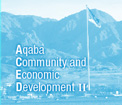SOLAR POWER LIGHTS 12 WADI RUM TOURIST CAMPS

Wadi
Rum and Disi are desert and mountainous areas located in the south of Jordan.
They are popular for sightseeing, outdoor sports such as rock-climbing and
trekking, and for its connection to Lawrence of Arabia. The area is now
internationally recognized as a world heritage site and is one of Jordan's
important tourist destinations. The influx of tourists to this once isolated
area has substantially increased the financial stability of the Bedouin people who
rely heavily on local tourism as a source of income. The Bedouins provide
desert tours, sunset and evening meals and camping style accommodation for
groups between 20-60 people. The camps are relatively remote and are not
serviced by main power grids.
This
project engaged the owners of small eco-tourism camps in the Wadi Rum World
Heritage Area to replace diesel generators with alternative, low energy
lighting systems.
The
ACED program conducted a comprehensive feasibility study for developing “green
power” solutions that would eradicate the use of diesel generators to power
lighting systems in the remote desert camps. The ACED II Program, in
cooperation with the environment directorate of ASEZA, implemented the study
results and installed the solar energy power systems at twelve camps in Wadi
Rum and Disi area, which were selected based on their location suitability and
commitment for the project. The installation of these modules is in line with
ASEZA’s strategy to provide environmentally friendly power generation
solutions, protect the environment in Wadi Rum reservation and empower locals
to adopt environmentally appropriate alternatives. Each camp had a 500 Watt solar
power system that is sufficient to replace diesel generators and provide
lighting power supply for the camp facilities including accommodation, dining
area, kitchens, and service facilities. This environmentally-friendly solution restored
the natural quiet of the desert night and enriched the eco-tourism experience
of the tourists.
The
ACED II Program will train users on operating and maintaining these systems. In
addition, The ACED II program will conduct a training workshop on the
installation and maintenance of the solar systems for the ASEZA staff to build
their capacity and secure sustainability of the installed systems. Furthermore,
the ACED II program installed one solar unit at the Aqaba Vocational Training
Institute (AVTI). This module will be used to train the VTC students and equip
them with new skills in line with market demands.







